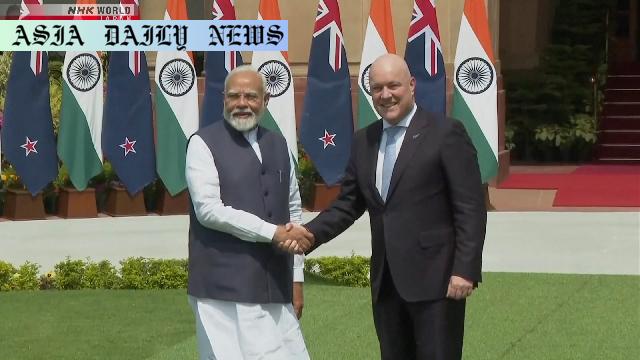Free Trade Talks restart discussions on economic collaboration between India and New Zealand after a decade-long pause.
India and New Zealand restarted free trade talks after a decade pause.
Negotiations aim to counter global tariffs and deepen economic ties.
Discussions fueled by New Zealand PM Luxon’s visit to India.
A 60-day goal has been proposed to finalize the agreement.

India and New Zealand Reignite Free Trade Talks
After nearly a decade of stalled negotiations, India and New Zealand have decided to restart free trade talks. This significant development was announced during New Zealand Prime Minister Christopher Luxon’s five-day state visit to India, where he met with Indian Prime Minister Narendra Modi. The renewed discussions highlight a shared intent to strengthen economic ties amidst a backdrop of global trade tensions, marked especially by tariffs imposed by the Trump administration on various imports in previous years. Recognizing the opportunities for mutual benefits, the two nations aim to overcome past obstacles and push towards a more collaborative future.
Aiming for Resolution: The 60-Day Target
One of the most ambitious aspects of these renewed talks is the proposed timeline. Luxon expressed optimism at achieving a signed agreement within 60 days, signaling a strong commitment from both parties to fast-track their negotiations. The Prime Minister’s statement, “Let’s drive this relationship forward,” reflects a proactive approach to resolving key issues that have impeded progress since 2010. While previous talks stalled in 2015, primarily over access to India’s dairy market—an industry vital to its economy—there is cautious optimism this time, fueled by the evolving global trade environment and India’s growing willingness to expand its economic partnerships.
Historic Challenges and Future Prospects
India’s agricultural industry, which supports millions of small-scale farmers, has historically been a point of contention in trade talks. New Zealand, known globally for its dairy exports, has sought increased access to this sector, but Indian policymakers have been hesitant to expose such a sensitive industry to external competition. However, the tone of the current discussions suggests both sides are open to finding creative solutions that respect each nation’s economic interests. A successful agreement could unlock significant opportunities for trade in technology, manufacturing, and services, diversifying economic collaboration beyond contentious areas like agriculture.
Strategic Implications Beyond Trade
The renewed focus on a free trade agreement also reflects broader geopolitical dynamics. With the lingering effects of trade wars and increased protectionism in many global markets, nations like India and New Zealand are looking to forge bilateral agreements that mitigate risks and ensure economic stability. Additionally, this initiative highlights India’s growing role on the global economic stage, as it actively seeks to strengthen partnerships with countries across the Asia-Pacific region. For New Zealand, this cooperation opens doors to one of the largest and fastest-growing consumer markets in the world, making this a strategically valuable pursuit.
A Cooperative Step Forward
As Luxon’s visit concludes, the commitment to reviving free trade reflects broader aspirations for a prosperous future. Both sides must navigate complex issues in coming weeks, balancing sensitivities while accelerating progress toward a mutually beneficial agreement. If successful, the India-New Zealand free trade agreement could serve as a model for other nations, illustrating how persistent dialogue and shared economic goals can lead to meaningful partnerships. This bold step forward reaffirms the value of collaboration in today’s interconnected world.



Commentary
Optimism Surrounding Free Trade Talks Revival
The decision by India and New Zealand to revive their free trade agreement comes across as a much-needed step in today’s turbulent economic landscape. Having stagnated for nearly a decade, the resumption of these talks sends a strong positive message about the value of global partnerships. Both nations seek to deepen economic and defense ties, but the accelerated pace suggested by New Zealand Prime Minister Christopher Luxon has added an exciting element to the discourse. Such ambition speaks to the confidence both sides have in their ability to create an agreement that benefits their economies while addressing long-standing challenges.
Balancing Agricultural Interests and Economic Growth
Of considerable interest is how India and New Zealand will address the thorny issue of agricultural trade, specifically India’s heavily protected farming sector. India’s resistance stems from a steadfast commitment to safeguarding its small farmers. However, compromise may open new avenues for cooperation in manufacturing, technology, and services—areas where both economies can greatly benefit. Finding a middle ground that respects each nation’s priorities will be crucial in determining the success of this round of talks. How policymakers approach these issues may also influence other free trade agreements India seeks globally.
Geopolitical Aspects of the Agreement
Beyond economics, this deal carries significant geopolitical weight. The trade agreement signals a shift towards resilience amidst ongoing trade wars and protectionism pursued by other global powers. For India, securing stronger ties with New Zealand further consolidates its position as a key player in the Asia-Pacific region. Meanwhile, New Zealand can tap into a billion-plus consumer base in India, lending itself to immense economic opportunity. The stakes are high, but the potential rewards are even greater. A successfully negotiated agreement could redefine partnerships between mid-sized and emerging global powers.